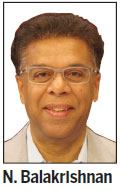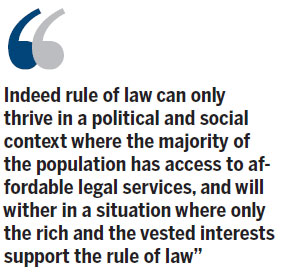Free legal aid for the needy helps rule of law
Updated: 2014-02-25 07:24
By N. Balakrishnan(HK Edition)
|
|||||||||
The rule of law is evoked in political discussions a lot in Hong Kong these days. As far as I know no one has ever come right out and said they are against the rule of law. So the question has to shift to what type of rule of law one wants in Hong Kong.
I think that most Hong Kong people would prefer a different type of rule of law rather than the current system that seems to serve only those with money to "buy" legal services.
I am not the only one making this observation. No less a person than the retired chief justice Andrew Li has said he was concerned about the number of people choosing to represent themselves in the courts presumably because they cannot afford to hire lawyers.
It is true that the Hong Kong government has a legal aid program that provides assistance in certain circumstances, but it must not be a comprehensive one since I don't see why anyone would want to represent themselves in courts and face seasoned lawyers on the other side, unless one cannot afford to hire the lawyers to increase their chances of a court ruling in their favour.

If anyone is concerned with justice and rule of law in a substantive sense, then they must be worried about this lack of affordability and availability to large sections of Hong Kong population. And yet one hears very little about this, either from most of the lawyers or those who want to have universal suffrage at once in Hong Kong.
It is clear to me that universal suffrage alone will not even begin to tackle the prevailing current problem of lack of legal services to anyone except the very rich in Hong Kong.
It is also worth noting that even without a vote for everyone, Hong Kong, to its credit, abolished the death penalty but the US and the Chinese mainland still retain it. And no prizes for guessing how disproportionately ethnic minorities are represented on death row in the US.
Given our small size, and relatively low crime rate, the legal fraternity in Hong Kong should be able to come up with "Affordable Legal Care" for the population of Hong Kong in conjunction with perhaps some form of enlarged legal aid program from the Hong Kong government.
Such a move to make legal service affordable, if it were to happen, will make most of the population realize how lucky they are to be living in a city which adheres to the rule of law.
Such a move to "democratize" the legal services will ensure more popular support for the rule of law among the population of Hong Kong than abstract exhortations to defend the rule of law from lawyers with vested interests, while the majority of the population cannot afford their professional services.

The question now facing Hong Kong is whether legal services should continue to remain available, in practice, exclusively to the rich or should steps be taken to make it available to those who genuinely need it, regardless of their means. This is a more important question confronting Hong Kong than abstract notions of "universal suffrage".
As the libertarian author and lecturer James Bovard once warned: "Well, one of the first things is to restore the rule of law, to place the government back under the cage of law. Another thing is to stop falling for the myth of democracy."
Indeed rule of law can only thrive in a political and social context where the majority of the population has access to affordable legal services, and will wither in a situation where only the rich and the vested interests support the rule of law.
Just a bunch of old men, wearing wigs made of horse hair, sitting in an old building not far from the Hong Kong zoo, cannot make sure that the rule of law prevail in future in Hong Kong. Only the majority of the population which has experienced the rule of law that is affordable can ensure that.
The author has been living and working in Hong Kong for the past two decades and spent his earlier years writing for various leading publications in Asia. He is currently the CEO of a company listed on the Hong Kong Stock Exchange.
(HK Edition 02/25/2014 page9)